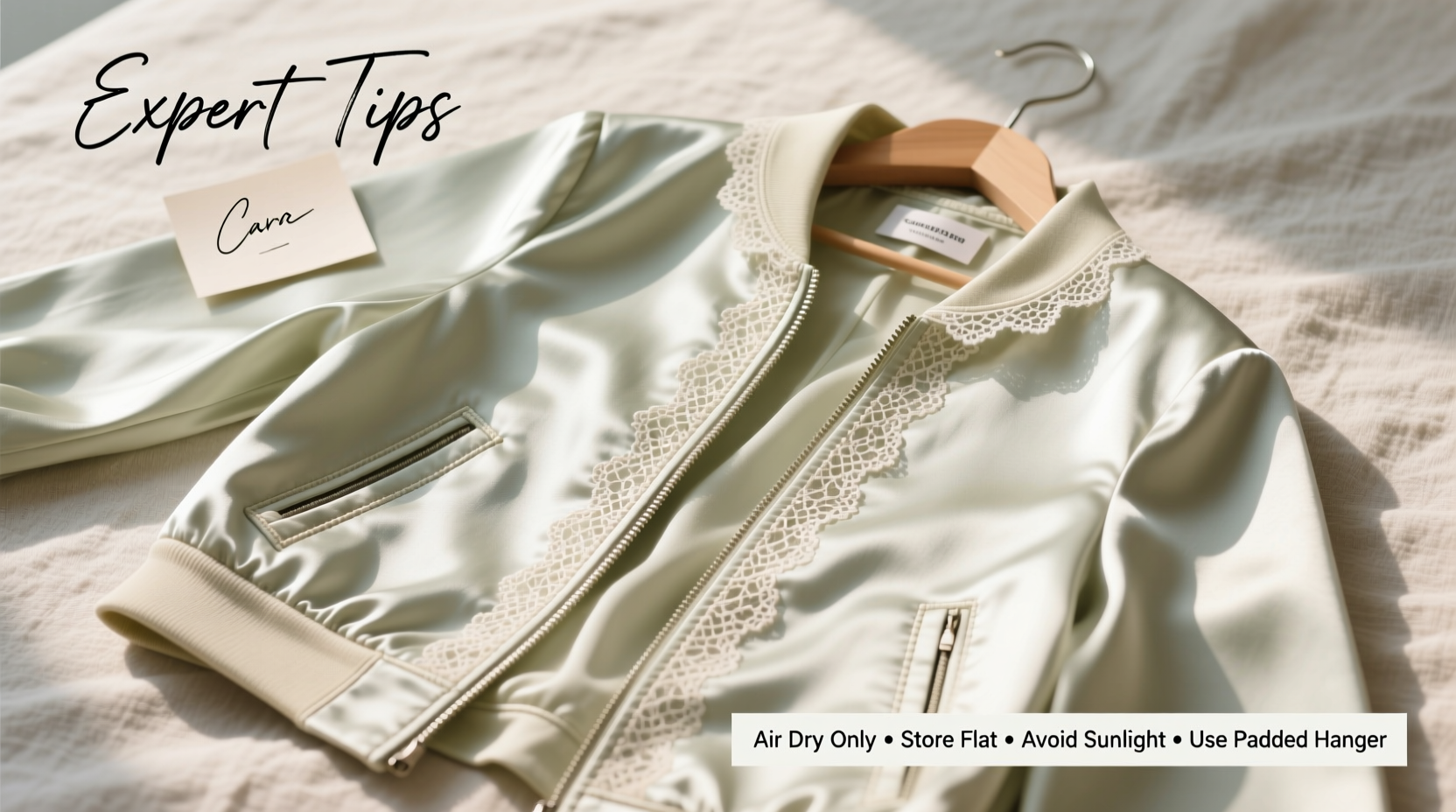Spring jackets are the unsung heroes of seasonal wardrobes—lightweight, stylish, and perfect for transitional weather. But their delicate fabrics, from silk-blends and soft cotton voile to fine wool and water-resistant technical weaves, demand more than casual treatment. A single misstep in care can lead to pilling, fading, shrinkage, or permanent creasing. To preserve both structure and elegance, a thoughtful, informed approach is essential. With the right habits, your favorite spring layer can remain vibrant and wearable for years, not just one season.
Understand Your Jacket’s Fabric and Construction

Before any cleaning or storage decision, identify what your jacket is made of. The care label provides baseline guidance, but deeper understanding prevents mistakes. For example, a linen-cotton blend may wrinkle easily but tolerate gentle machine washing, while a silk-twill bomber requires only professional dry cleaning. Similarly, structured jackets with padding or interlinings need support during storage to avoid collapsing at the shoulders.
Fabrics common in spring jackets include:
- Linen: Breathable and crisp but prone to wrinkling; needs careful ironing.
- Cotton voile or poplin: Lightweight and soft; can usually be hand-washed if untreated.
- Silk or silk blends: Luxurious but sensitive to water, sunlight, and abrasion.
- Nylon or polyester (technical fabrics): Often water-resistant; may require specific detergents to maintain coating integrity.
- Wool blends: Warm yet breathable; vulnerable to moths and felting if washed incorrectly.
Step-by-Step Guide to Cleaning Delicate Spring Jackets
Cleaning isn’t one-size-fits-all. Follow this timeline to safely refresh your jacket without damage:
- Inspect First: Check for stains, loose threads, or weakened seams. Address minor repairs before cleaning.
- Spot Clean When Possible: Use a microfiber cloth dampened with distilled water and a drop of mild detergent (like Wool & Cashmere Shampoo) to gently dab stains. Never rub.
- Determine Wash Method:
- Hand wash only? Fill a basin with cool water and mild detergent. Submerge briefly, swish lightly, then rinse thoroughly.
- Dry clean only? Take to a reputable cleaner who specializes in delicate garments.
- Machine wash safe? Use a mesh laundry bag, cold water, and delicate cycle—never spin dry.
- Rinse Thoroughly: Residual soap attracts dirt and degrades fibers over time.
- Dry Flat: Lay on a clean towel away from direct heat or sunlight. Reshape collar and pockets as it dries.
- Steam, Don’t Iron: Use a handheld steamer to remove wrinkles. Direct heat from an iron can melt synthetic fibers or flatten textured weaves.
“Many people ruin delicate jackets by assuming all light layers are washable. Silk and structured linens often need expert handling.” — Lena Moretti, Textile Conservator at The Atelier Restoration Lab
Do’s and Don’ts of Storage and Wear
How you store and wear your jacket impacts its longevity as much as cleaning does. Seasonal transitions are critical moments—don’t tuck it away still smelling of perfume or sweat.
| Do’s | Don’ts |
|---|---|
| Store in a breathable cotton garment bag | Use plastic dry-cleaner bags long-term (traps moisture) |
| Fill sleeves and shoulders with acid-free tissue paper | Hang on thin wire hangers (causes shoulder bumps) |
| Keep in a cool, dark closet with cedar blocks | Leave in direct sunlight or humid basements |
| Air out after wearing before storing | Overwear between cleanings—oils transfer and degrade fabric |
| Rotate use among multiple spring layers | Layer over rough knits that cause pilling |
Real Example: How One Wardrobe Revival Was Achieved
Sophie, a graphic designer in Portland, inherited her mother’s 1990s vintage trench coat made of lightweight gabardine with a floral silk lining. Though beautiful, it had yellowed under the arms and sagged at the shoulders from years in a plastic cover. She brought it to a specialty cleaner who used enzyme-based solutions to lift stains without harming the lining. After cleaning, she stored it on a padded hanger inside a linen garment sack, with lavender sachets to deter moths. Two years later, the coat remains a centerpiece of her spring wardrobe—proof that proper care can restore and sustain even sentimental pieces.
Essential Care Checklist for Every Owner
To ensure your delicate spring jacket stays fresh, follow this monthly checklist:
- ✅ Inspect for stains, odors, or insect signs
- ✅ Spot clean collar, cuffs, and pockets
- ✅ Air out in shaded outdoor space for 30 minutes
- ✅ Check hanger shape—replace if bent or too narrow
- ✅ Rotate with other outer layers to reduce wear
- ✅ Verify storage conditions: humidity below 50%, temperature stable
- ✅ Schedule professional cleaning once per season if worn weekly
FAQ: Common Questions About Spring Jacket Care
Can I wash a silk-lined jacket at home?
Only if the care label explicitly permits it. Most silk-lined jackets should be professionally dry cleaned. Home washing risks shrinking the lining, causing puckering or delamination from the outer shell.
How do I prevent pilling on lightweight cotton jackets?
Pilling occurs from friction. Avoid wearing backpacks or seatbelts over delicate fabrics. Turn the jacket inside out when storing or laundering, and use a fabric shaver sparingly if pills form.
Is it safe to use perfume while wearing a spring jacket?
Spritz perfume on your skin or hair before putting on the jacket. Alcohol and oils in fragrance can stain or discolor delicate textiles, especially pale silks and linens.
Protect Your Investment with Consistent Habits
A delicate spring jacket is more than a seasonal trend—it’s a statement of personal style and intentional living. By treating it with respect through mindful wear, precise cleaning, and intelligent storage, you extend not only its lifespan but also its emotional and aesthetic value. These habits take little time but yield lasting rewards: a closet that feels curated, not cluttered, and garments that age gracefully rather than prematurely.









 浙公网安备
33010002000092号
浙公网安备
33010002000092号 浙B2-20120091-4
浙B2-20120091-4
Comments
No comments yet. Why don't you start the discussion?